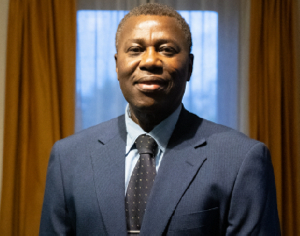Once awhile, I Google the names of some of our major Ghanaian leaders, past and present, to find out about an interesting piece or two that I could read in reasonable time, which often means about 30 minutes or less, to refresh my memory about one or two significant aspects of their lives and times that still resonate with us, the living, in terms of their relevance to contemporary existence.
It was during one such occasion when I Googled up the name of the late Prime Minister K. A. Busia that I chanced upon the aforementioned letter which had been posted on Sankofaonline.com, a quite magnificent website created and operated by some leaders of Chicago’s Ghanaian community here in the United States.
The letter is quite fascinating in that it reveals far more about the writer than it does about the intended recipient. In it, the deposed Life-President Nkrumah passionately attempts to vengefully even out scores with his former main parliamentary opposition leader and successor to the presidency.
In the case of Dr. Busia, it was prime ministerialship, of course, and one that was closely modeled after Britain’s Westminster system, with direct periodic accountability to the people.
In essence, Nkrumah appears to exult in the fact that like his successor, who had celebrated his predecessor’s overthrow by some senior members of the Ghana Armed Forces and the Ghana Police Service, Busia had also been ousted by the same military and police hierarchy.
Among the Akan-language-speaking people of Ghana and the Ivory Coast, Togo and elsewhere in the West African sub-region, there is a dictum that says that the destinies of all humankind are intertwined. In the Akan original, this dictum runs as follows: “Abaa a yede bo Takyi no, eno ara na yede bo Baah [nso],” which roughly translates into English as follows: “It is the same willow cane/whip that is used in whipping Mr. Takyi that is also used in whipping Mr. Baah by turns.”
The letter is an eyeopener if also because it definitively settles the hitherto controversial question of whether Nkrumah ruled Ghana for 15 years or 9 years, as some critics and supporters of the leader of the proto-Convention People’s Party maintain, not necessarily in any respective order. In his letter, whose rather polite, if also ironic, salutation begins with “My Dear Kofi,” Ghana’s first postcolonial prime minister and later president observes having ruled the country for some 15 years.
If we take the latter temporal measurement to imply that Nkrumah had occupied the highest office of the land five times the duration occupied by his arch-nemesis, then, of course, it becomes clearly unfair for the author of the letter to compare his material achievements as the country’s democratically elected leader with those of his recipient and successor.
In a predictably “Trumpian” attempt at self-aggrandizement, Nkrumah erroneously claim to have caused the construction and/or establishment of Ghana’s flagship health center, namely, the Korle-Bu Teaching Hospital. No such claim could be farther from the truth, if only because the Korle-Bu Hospital was founded in 1925, about a whopping 26 years before the future Prime Minister Nkrumah acceded to the highest office of the land. And like the Takoradi Harbor, the very first modern seaport of its kind in the West African sub-region, Korle-Bu Hospital was established by the British-Canadian colonial governor and renowned civil engineer, Maj.-Gen. Gordon Frederick Guggisberg. And both Korle-Bu and Achimota School, which Nkrumah attended, had far more to do with the creative genius of Nana Sir Ofori-Atta, I, than with Mr. Kwame Nkrumah.
What is also significant to observe here is the fact that, clearly in terms of architectural landmarks, Nkrumah is without compeer or compare among Ghanaian leaders of the postcolonial era. But even so, as Dr. J. B. Danquah poignantly pointed out to his former protégé, civilization is best measured by the extent to which freedoms and human and civil rights are afforded the individual within any modern polity, and not merely by the littering of the geopolitical landscape with architectural structures.
In terms of press freedom and democratic culture, for only two striking examples, Prime Minister Busia dwarfs Life-President Nkrumah by light years, the invariably facile and routine trotting out of “Apollo 568” cause célèbre or the Sallah Case by ardent detractors of the leader of the Progress Party (PP) notwithstanding.
Nkrumah also accuses Busia of being pathologically pro-Western imperialism. But, of course, such a jaundiced and vitriolic tirade does not stand to logical reasoning, since Nkrumah himself was closely aligned with the state capitalists of the Eastern bloc countries, in particular the erstwhile Soviet Union and Communist China.
As well, Nkrumah’s calling Busia “a political weakling” reminded me of Mr. Donald Trump’s calling Mrs. Hillary Clinton a weak political figure. In both instances, the leaders sneeringly tagged as “weaklings” amply demonstrate that when it comes to matters pertaining to cranial prowess, they are far and away nonesuch geniuses where their bitterest critics and ardent ideological opponents clearly demonstrate themselves to be mere pedestrians.
Nkrumah well appears to recognize this factual reality when he caustically carps Busia for presuming to be smarter than all the rest of his fellow African leaders by calling for a conciliatory dialogical engagement with the racist leaders of South Africa’s apartheid regime, “in which you seek to create the impression that you are the only black man on Earth who is capable of bringing pressure to bear on the racists in South Africa and other diabolical policies too numerous to mention here.”
Naturally, Nkrumah ignores the well-known fact that his CPP regime’s closest and largest trading partner on the African continent was the same racist South African government (See Kwame Arhin’s Kwame Nkrumah: His Life and Work).
*Visit my blog at: kwameokoampaahoofe.wordpress.com Ghanaffairs
Opinions of Tuesday, 8 November 2016
Columnist: Okoampa-Ahoofe, Kwame















